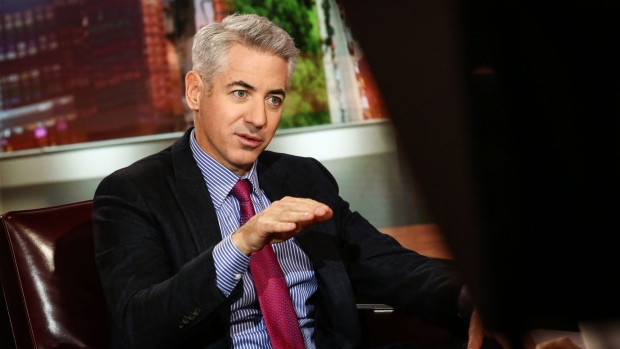Nov 23, 2022
Bill Ackman Says Pershing Has Large Notional Short Position Against HK Dollar
, Bloomberg News

(Bloomberg) -- Bill Ackman, founder of hedge fund Pershing Square Capital Management LP, said he’s betting against the Hong Kong dollar and its peg with the greenback.
Pershing owns a “large notional position” in Hong Kong dollar put options -- bearish wagers on the currency -- he said in a tweet, adding that the peg no longer made sense for Hong Kong. He referenced a Bloomberg Opinion column by Richard Cookson, which argued that a surge in debt, falling asset prices and a weakening economy will make defending the currency link problematic.
The Hong Kong Monetary Authority, the city’s de-facto central bank, has a mandate to keep the local currency trading at HK$7.75 to HK$7.85 per US dollar -- a narrow band that’s been in place since 2005. Sustained weakness this year has prompted authorities to defend the currency’s peg on multiple occasions, by mopping up liquidity and sending borrowing costs higher.
But officials have repeatedly said that the almost 40-year old peg works well and there are no plans to change it. They point to the city’s foreign exchange reserves -- currently $417 billion -- which offer plenty of firepower to defend the currency in the face of capital outflows.
Along with providing Hong Kong with financial stability, the peg also allows Chinese companies to raise cash in the world’s dominant currency while remaining within the nation’s borders.
A representative for the HKMA on Thursday reiterated there’s no plan nor need to change the peg system.
The Hong Kong dollar edged higher to around 7.81 per greenback on Thursday.
Carry Trade
Before this month, it had been trading near the weak end of its band since May, as investors borrowed the currency cheaply and sold it against the higher-yielding greenback. But that so-called carry trade became less attractive after the HKMA’s intervention shrank the interbank liquidity pool by about 70%.
That means Ackman’s bet may be a lonely one. There’s little evidence in the derivatives market to suggest significant bearish bets. Three-month risk reversals for the US-Hong Kong dollar pair, a gauge of its expected direction over that time frame, have flipped negative, according to data compiled by Bloomberg.
“It’s Hong Kong’s call to change the peg or not, and the optimal option is to keep it,” said Stephen Chiu, chief Asia FX & rates strategist at Bloomberg Intelligence in Hong Kong. “And there’s no way for it to be broken by speculators.”
Currency Cost
Having a currency peg comes with a cost. The city follows US monetary policy, regardless of domestic economic conditions, which often means a painful disconnect. Hong Kong endured almost six years of deflation in the wake of the 1997 Asian financial crisis when US borrowing costs were high and the local economy was struggling.
Ultra low interest rates from 2008 to 2016 fueled a property bubble and widened the gap between the rich and the poor. Now Hong Kong is forced follow rapid US rate hikes at a time when its economy is contracting.
The currency was briefly at the center of US-China tensions in 2020, after Beijing imposed a national security law on the city. Some advisers to then-President Donald Trump wanted the US to undermine the peg to punish China for limiting Hong Kong’s autonomy, people said at the time. The proposal faced strong opposition and was quickly met with skepticism by economists.
Ackman referenced such geopolitics in a second tweet.
“If China is indeed a strong, independent sovereign, why does it need to peg its currency and that of Hong Kong’s to the US dollar?” he wrote. He said the peg was “almost embarrassing” for China due to its decoupling from the US in another, since-deleted tweet.
Previous Bets
It’s not the first time Ackman bet the Hong Kong dollar peg will break. He told a conference in 2011 that he’d placed a wager looking for a dramatic strengthening in the city’s currency, which proved fruitless. He said the Hong Kong dollar was “materially” undervalued at the time.
In 2020, Kyle Bass, the founder of Hayman Capital Management, started a new highly-leveraged fund to make all-or-nothing wagers on a collapse in Hong Kong’s currency peg. His bet incurred big losses, according to a US Securities and Exchange Commission case. George Soros tried and failed to break the Hong Kong dollar’s peg to the greenback in the wake of the Asian financial crisis in 1998.
Earlier this month, Hong Kong’s Financial Secretary Paul Chan took aim at short sellers such as Ackman and Bass, without naming them.
“If you bet against the Hong Kong dollar, you are bound to lose,” Chan said in a speech at a global bankers summit in the city on Nov. 3. “You can verify my advice with certain hedge fund managers in the US who have been wrong about Hong Kong dollar time and again.”
--With assistance from Chester Yung.
(Updates throughout.)
©2022 Bloomberg L.P.






